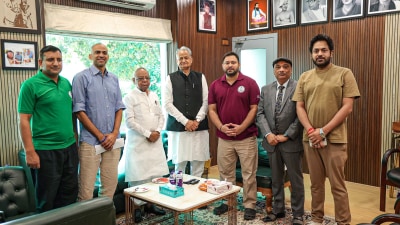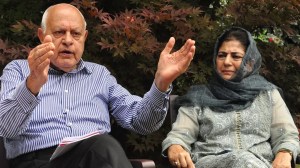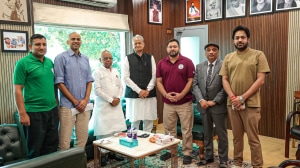Mahatma as metaphor
Liberals have always been sceptical of Mahatma Gandhi. In fact, they have been suspicious of what they termed were his "muddle-headed...

Liberals have always been sceptical of Mahatma Gandhi. In fact, they have been suspicious of what they termed were his "muddle-headed" ideas. In his, An Autobiography, Nehru, taking cudgels with such liberals, writes: "Whether Gandhiji is ‘muddle-headed’ or not we can leave to our Liberal friends to decide…True his millions of followers were ‘muddle-headed’. They knew nothing of politics and constitutions; they could think only in terms of their human needs, of food and shelter and clothing and land."
Yet, it is precisely in terms of human needs, of food and shelter and clothing and land, that the Indian liberal legacy has proved to be a miserable failure. The original social contract that we, the people, implicitly signed with the rulers, after independence, seems to have been sabotaged by the latter. So, for instance, while we continue to die like cattle on the streets, the entire police force in the country has virtually become the SPGs of VVIPs.
And who are the VVIPs? One of them, Dhumal Singh, has about 192 cases of murder, loot, and arson registered against him in several courts in various states. By the EC’s own admission there are 600 of such Dhumal Singhs in Parliament as well as the state legislatures, cutting across political parties. Thirteen Lok Sabha elections and numerous Assembly elections have made absolutely no difference. Whether it is the Congress or the BJP, the Third Front or the Communists, the power of money, muscle and the mafia (three Ms) continue to muzzle our political choices with communalism and casteism, corruption and criminalisation (four Cs) increasingly becoming the basis of our mobilisation. While the people suffer, the ‘undemocratically’ elected representatives of the people have brazenly ended up cornering all the privileges, power and pelf for themselves.
By seriously considering the Mahatma’s "muddle-headed" ideas relevant to the reworking of the Indian Constitution today, the National Commission to Review the Working of the Constitution (NCRWC) has come up with a new vision. But they soon give it up to make mere routine nuts and bolts recommendations, that have been made by other commissions in the past. Other than identifying the syndrome of the three Cs and four Ms, they fail to pinpoint the crux of the problem or work out an institutional alternative.
Let us briefly consider the Gandhian model on elections as the NCRWC lays it out: "Direct elections should be held on the basis of adult franchise at the level of Panchayats and other local bodies. Panchayats and other local bodies could elect the zila parishads and they could together elect the State legislatures. These three could elect the Parliament and in the last analysis the four of these could elect the President. The Prime Minister and the Chief Ministers could be elected by Parliament and State legislatures concerned."
The Gandhian alternative begins by constructing the grassroots basis of Indian democracy, a basis that has been completely eroded. The relationship between the elector and the elected is laid out at the level of a primary group intimacy: face-to-face contacts on a regular basis. Thus, the accountability to the people, rock bottom in the present parliamentary system, is reinvented within this framework. A new form of public morality is built into the system. Instead of a coercive maharaja, or a patronising mai-bap sarkar, a notion of sewa becomes the very sine qua non of representation. The entire approach is bottom-up instead of the present top-down.
The implication of the Gandhian model is ‘constituency selects candidates’, a notion that the NCRWC surprisingly fails to recognise. Although indirect elections were not Gandhiji’s suggestions, the NCRWC claims that present day Gandhians have worked it out. Indirect elections, as evident in the last US presidential elections, can be unfair: The candidate with the majority popular votes ended up losing to that with the majority electoral college votes.
The panchayat elections in the Gandhian framework are supposed to be on a party-less basis, something that the NCRWC again ignores. The idea was to have a consensus at the local level and the representatives were supposed to act as the "trustees" of the people. This idea was not without precedent. Edmund Burke, who enunciated the trusteeship theory of representation and who unequivocally rejected any idea of a mandate, argued that Parliament was "not a congress of ambassadors from different and hostile interests… but a deliberative assembly of one nation, with one interest, that of the whole."
Political parties today, however, are a permanent feature of all polities the world over. Describing political party representatives as a ‘delegate’, the famous Labour party leader Aneurin Bevan argued: "A representative person is one who will act in a given situation in much the same way as those he represents would act in that same situation. In short, he must be of their kind…Election is only one part of representation. It becomes full representation only if the elected person speaks with the authentic accents of those who elected him." Even with political parties the ‘constituency select candidates’ can be built in.
Since the Bevanite argument appears more in tune with present day realities than the Burkean view, it is imperative while reinventing a new constitutionalism, to build a legal criteria so that constituents should have a major say in the selection of candidates. This has been built through a system of primaries in the US. In Britain, this has evolved through a complex selection procedure. For instance, Labour party candidates are selected on the basis of one-third say of trade unions, one-third of the parliamentary wing of the party and one-third choice of constituents.
In India, political parties during elections select candidates either on the basis of patronage doled out by party High Commands, or by a system of auctioneering to the highest bidder. The cash transactions during the initial stage of elections itself is so large that it makes Bollywood’s latest scams look like peanuts. It is this illegal cash nexus that brings in both the muscle and the mafia. In order to cement the bond between the elector and the elected, we should extend the Gandhian model of direct elections from the local level to the legislature and the parliament. This has to be based on the "constituency selects candidates" basis.
The EC should be mandated to enforce that all political parties, when they select their candidates, must do so on the basis of the wishes of the constituents. Only if an institutional framework for the grassroots basis of Indian democracy is reinvented, can the rulers be prevented from hijacking the system in their favour.





- 01
- 02
- 03
- 04
- 05


























